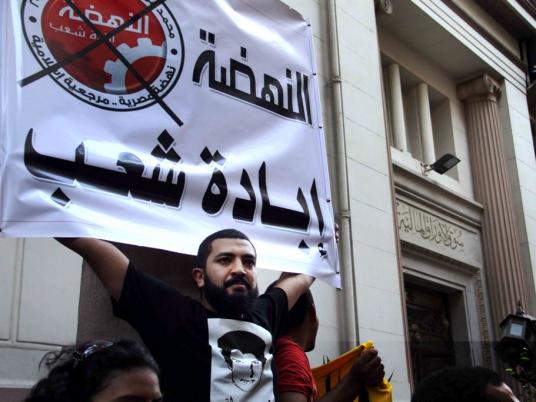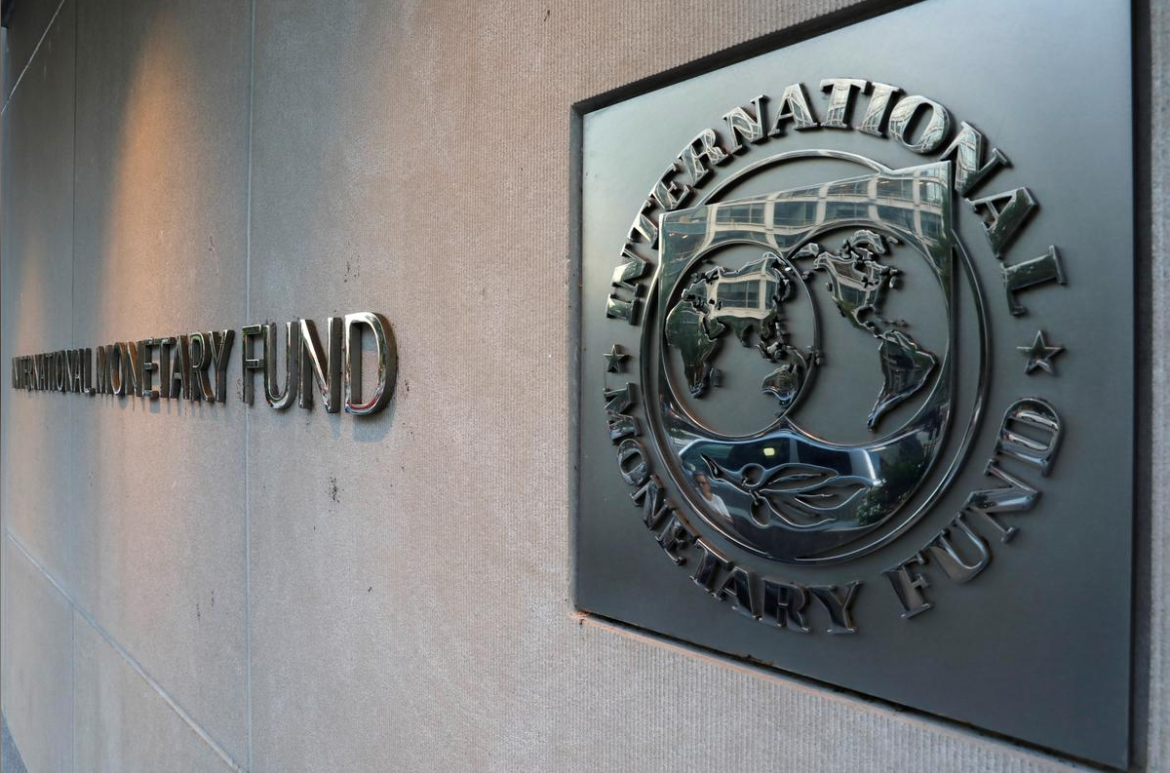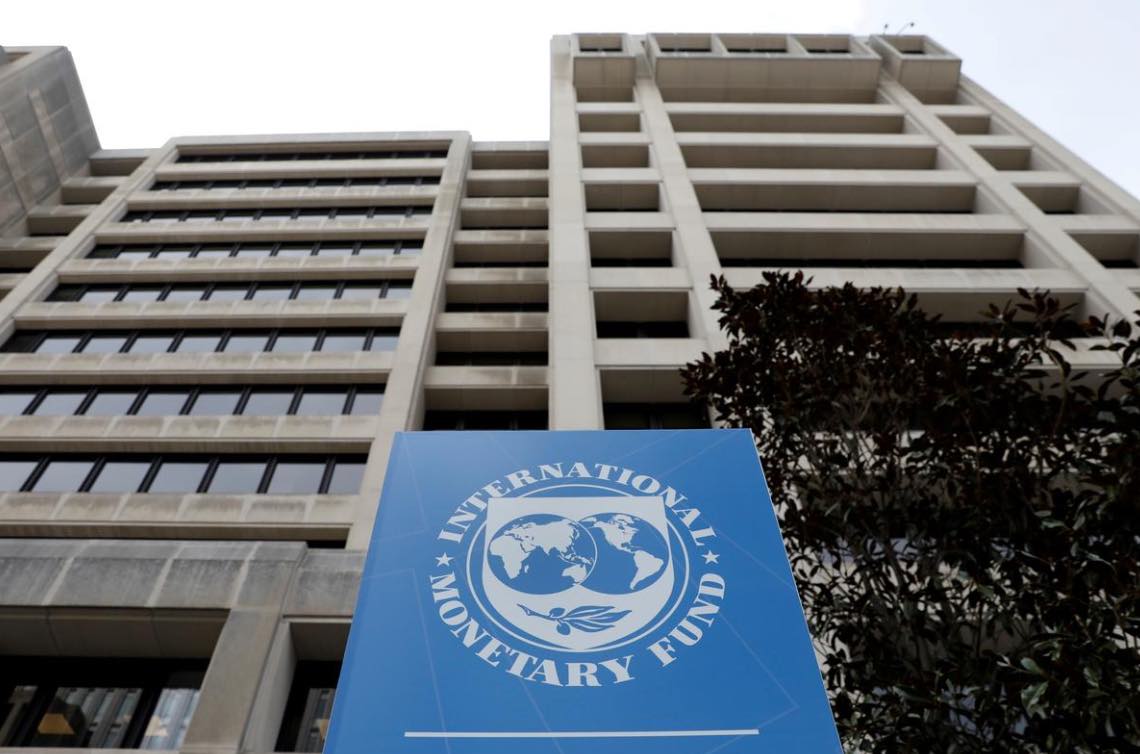
Several hundred protesters gathered on Monday evening outside the stock exchange building in downtown Cairo and marched to the headquarters of the Cabinet to protest the government’s negotiations with the International Monetary Fund over a loan whose value is estimated at $4.2 billion.
The demonstration came as a technical delegation from the IMF visits Cairo this week to continue negotiations that began in earnest last summer following the election of President Mohamed Morsy.
The talks have been shrouded in secrecy, with the government revealing few details of the proposed terms and its ensuing economic reform program. What austerity measures the government is looking at implementing have been made public piece by piece in local press, many in unsourced reports.
On Monday, Finance Minister Momtaz al-Saeed stated the government’s intention to sign a memorandum of understanding with the IMF by Wednesday of this week. The final loan agreement is expected to be signed in January 2013 and is aimed at diminishing the government’s budget deficit which is officially projected to reach LE140 billion, or approximately US$23 billion.
Monday’s march was organized by 17 groups including the Popular Campaign to Drop Egypt’s Debt, the Strong Egypt Party, the Popular Current and the April 6 Youth Movement. Former leftist presidential candidate Khaled Ali was among those present.
A day earlier, the organizers sent a letter to Prime Minister Hesham Qandil and IMF head Christine Lagarde in which they stated their opposition to the proposed loan.
Participants in Monday’s march protested the harsh measures they expect the IMF to impose on Egypt through conditions in the agreement.
They raised chants that described the IMF loan as economic colonialism and expressed opposition to all sources of foreign credit, including the US$3 billion loans promised by Qatar and Saudi Arabia after the revolution. The chants objected to IMF conditionality and called for a higher minimum wage.
Protester Waleed Fawzi, a 27-year-old financial analyst, pointed to the economic austerity of IMF intervention in other countries around the world.
“We all know the conditions that are coming,” he said. “And Egypt’s economy is too weak to handle this.”
Another protester, Hani Ashraf, 30, said he is against credit in general and called for an end to all negotiations with the IMF.
But the march also raises the question of how effective the anti-IMF protests could be, with the IMF delegation and government officials already elbow-deep in drawing up a reform plan. Experts say it is highly unlikely for the negotiations to be called off, but not impossible.
“The IMF will not go forward with the loan unless there is social agreement,” said Salwa Antary, former manager of the National Bank of Egypt and head of the economics committee of the Egyptian Socialist Party.
The government may be insistent on obtaining the loan, she added, but strong opposition could discourage the IMF from moving forward.
She agreed with the protesters that a more progressive tax structure and clearer plans from the government would be best for reviving the economy, not across-the-board sales taxes, which was recently suggested.
In the past week, local media have reported a series of reform proposals intended to attract the IMF loan. They include the elimination of the subsidy on 95 octane gasoline and a price increase for natural gas used in homes, according to Al-Masry Al-Youm. Meanwhile, Al-Ahram newspaper reported expected increases in consumption taxes as well as initiatives to bring informal activities and tax evaders into the tax base.
These announcements are insufficient, according to Monday’s demonstrators. Many said they were protesting the government’s lack of transparency throughout negotiations with the IMF and its failure to find alternative solutions to the country’s desperate economic problems.
Ashraf faulted the government for neglecting to hold a discussion with the public about the terms of the loan.
“Nobody knows anything,” he said, “because they haven’t announced anything.”
Antary said the government insists on secrecy in negotiations with the IMF because of the popular fallout that is expected from the details of the related economic reforms. She warned that harsh austerity measures risk sparking a popular uprising, which the government could control only through repression.
“People want to know where the money is going,” said fellow protester Habiba Ramadan, 23, a researcher at the Egyptian Center for Social and Economic Rights.
Omar Salaam, a 43 year-old government employee who joined protesters in front of the Cabinet building, described the government’s performance on the economy as unsatisfactory.
“The Brotherhood promised the Nahda project and then began right away negotiating with the IMF,” he said, referring to the Freedom and Justice Party’s electoral program.
“This is nothing new,” he said. “We have replaced the Mubarak state with the Morsy state.”



